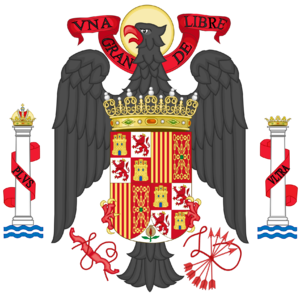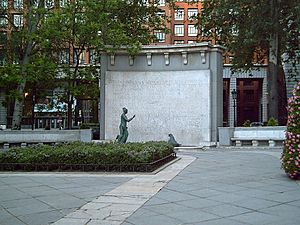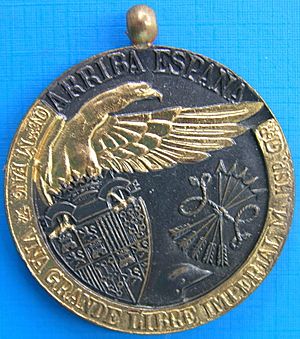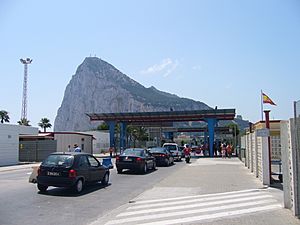Mottos of Francoist Spain facts for kids
The mottos of Francoism were special sayings that showed the main ideas of the Francoist government in Spain. This government was led by Francisco Franco for many years. These mottos were like short, powerful messages. They helped spread the government's beliefs to everyone.
The Francoist government used different ideas, but it often used Falangism to connect with people. Falangism was a political movement. It liked simple ideas and taking action. This made it easy to create mottos that people could remember and repeat.
These mottos first appeared during the Second Spanish Republic, before the war. They were used by right-wing groups and nationalist parties. But they became very popular during the Spanish Civil War (1936–1939). The Nationalists, who supported Franco, used them as a strong tool to get people on their side. They helped convince many people to agree with nationalist ideas. Even after the war, during Franco's rule (1939–1975), these mottos were often used as chants.
The Nationalists won the war. They also successfully made people think that "national" meant "Spain itself." This happened because Franco's government stayed in power for a long time. There was not much public resistance, even though some people secretly opposed it. After Franco's death in 1975, Spain began its move to democracy. During this time, Franco's mottos and symbols were put aside. People even started using other words instead of "Spain" sometimes. They used terms about different regions of Spain more often.

Contents
- ¡Una, Grande y Libre! (United, Great, and Free)
- Una patria, un estado, un caudillo (One Homeland, One State, One Leader)
- ¡Arriba España! (Up with Spain!)
- Si eres español, habla español (If You're Spanish, Speak Spanish)
- Rusia es culpable (Russia is Guilty)
- Gibraltar es español (Gibraltar is Spanish)
- How People Opposed Franco's Mottos
- See also
¡Una, Grande y Libre! (United, Great, and Free)
Una, Grande y Libre was a very important motto for Franco's government. It means "United, Great, and Free." This saying showed what the government wanted Spain to be:
- United: This meant Spain should be one country. It was against any idea of different regions breaking away. It also opposed giving regions too much power.
- Great: This referred to Spain's past as a large empire. It also hinted at building a new empire, especially in Africa.
- Free: This meant Spain should not be controlled by outside influences. The Nationalists believed in a "Judeo-Masonic-Communist conspiracy." They thought this group controlled countries like the Soviet Union and the United States. They saw these as threats to Spain.
A student named Juan Aparicio López created this motto. It was later used by the Falange Española de las JONS, a political party.
People often used Una, Grande y Libre at the end of speeches. The leader would shout "¡España!" three times. The crowd would answer "¡Una!", then "¡Grande!", and finally "¡Libre!". This was similar to how "Amen" is used in church. It was also like the "Sieg Heil!" chant used in Nazi Germany.
Franco himself used this idea. In his last message to the Spanish people in 1975, he spoke about "the great task of making Spain united, great and free." The motto was also part of the Falangist song, Cara al Sol. The song ended with "¡España una! ¡España grande! ¡España libre!"
Una patria, un estado, un caudillo (One Homeland, One State, One Leader)
While ¡Una, Grande y Libre! was very common, another motto was also used a lot. This was Una patria, un estado, un caudillo. It means "One Homeland, One State, One Leader." It was popular from 1936 to early 1940.
José Millán Astray, a close friend of Franco, spread this motto. He greatly admired Franco. At the start of the Civil War, Millán Astray traveled around areas controlled by the Nationalists. He convinced soldiers and officers that Franco should be Spain's leader.
Millán Astray got the idea from the Nazi motto "Ein Volk, ein Reich, ein Führer." This meant "one people, one empire, one leader." He changed it to fit Spain. When Franco became the head of state, all newspapers and postcards in Nationalist areas had to print this motto at the top.
Why Three-Part Mottos Were Important
Many Francoist slogans had three parts. This was a clear nod to religious ideas, like the Holy Trinity (Father, Son, and Holy Spirit). It made Spain seem like the Roman Catholic Church, which was seen as "universal," "chosen," and "united." This connection was part of National Catholicism, a key idea in Franco's government.
Throughout history, many ideas have been put into three-part mottos. For example, "Liberté, égalité, fraternite" (liberty, equality, fraternity) was used during the French Revolution. "Dios, Patria y Libertad" (God, Motherland and Freedom) is used in the Dominican Republic.
¡Arriba España! (Up with Spain!)
¡Arriba España! was another important slogan. It means "Up with Spain!" The word "up" was chosen instead of "long live." This was because "live" was not seen as strong enough. "Up" showed that Spanish patriots were ready to act and improve Spain. It also suggested that God had a plan for Spain.
A writer named José María Pemán explained it in 1939: "When we say 'Up with Spain,' we sum up our history and show our hope. We want Spain to return to its 'rightful place.' That place is 'up,' meaning close to the spirit, to the ideal, to faith... and most of all, close to God."
Si eres español, habla español (If You're Spanish, Speak Spanish)
This motto means "If you're Spanish, speak Spanish." Another similar motto was "Speak the language of the empire." These sayings were used to make people speak only Spanish.
These mottos were especially used in Catalonia. Franco's army took over Catalonia in 1939. After that, the government tried to stop people from speaking Catalan. This continued for many years after the war.
Rusia es culpable (Russia is Guilty)
This slogan came from a speech by Ramón Serrano Suñer in 1941. This was the day after Germany invaded the Soviet Union. He blamed Stalin's communist Russia for the Spanish Civil War. He also encouraged supporting Hitler's Germany against them.
This quote was printed in newspapers. It was used by groups who were against the Soviet Union. These groups formed the Blue Division. These were Spanish volunteers who joined the German army. Franco's government said Spain was neutral, but Franco supported Germany. Later, other countries pressured Franco to bring the division home.
People often blamed Russia for problems. For example, "the Moscow Gold" was a term used. It referred to gold reserves that Spain's Republic sent to the Soviet Union for military help during the war. Also, the "Children of Russia" were Spanish children sent to the Soviet Union for safety. Unlike those sent to other countries, they were not allowed to return to Spain.
Spain got a chance for symbolic revenge in the 1964 European Nations' Cup. Spain played against the Soviet Union in football and won. This showed how football was used to ease social tensions. People even used the phrase "Pan y fútbol" ("Bread and football"). This meant giving people entertainment to distract them from problems.
Gibraltar es español (Gibraltar is Spanish)
Gibraltar is a small territory at the southern tip of Spain. It was given to Britain in 1713. Since then, Spain has often wanted it back. The demand for Gibraltar changed over the years.
During World War II, Franco tried to use Gibraltar to his advantage. He used it in talks with both Hitler and the Allied powers. Spain did not end up fighting in the war. After Germany lost, Franco's government became isolated. The "Gibraltar is Spanish" slogan was used to unite people in Spain.
There were protests against Britain. People would chant "Spanish Gibraltar!" A big protest happened in 1955 when Queen Elizabeth II visited Gibraltar.
An official exhibition called "Spanish Gibraltar" was held in 1955. It showed items from towns near Gibraltar. People in San Roque, a town close to Gibraltar, were worried. They feared that a special painting they sent to the exhibition would not be returned. But their worries were overcome, and the painting was displayed.
Many towns in Spain have streets named "Spanish Gibraltar." This shows how important this idea was for Spanish pride.
How People Opposed Franco's Mottos
Not everyone agreed with Franco's mottos. Some people made fun of them. For example, they would say, "There's only one Spain (because if there were another, we'd all be there)." This was a way to show they did not like the government.
People also protested in quiet ways. When chanting Una, Grande y Libre, some would shout the word "Libre" (Free) louder than the others. This showed their wish for freedom. The film The 13 Roses (2007) shows this. It is about a group of girls waiting for a death sentence in 1939. One reason they were in prison was for spreading a motto against Franco: menos Franco y más pan blanco (Less Franco and more white bread). This was a criticism of Franco and his promises.
See also
 In Spanish: Lemas del franquismo para niños
In Spanish: Lemas del franquismo para niños
- Symbols of Francoism
- FET y de las JONS
- Movimiento Nacional
- Francoist Spain
- Sociological Francoism
- Nationalism
- Francisco Franco
 | Anna J. Cooper |
 | Mary McLeod Bethune |
 | Lillie Mae Bradford |




